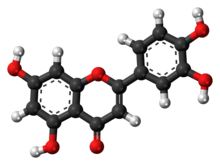Λουτεολίνη
Φυσικό φλαβονοειδές
Η λουτεολίνη είναι φλαβονοειδές που ανήκει στην υποκατηγορία των φλαβονών. Έχει απομονωθεί ως φυσικό προϊόν από πολλά φυτά ενώ πιο συχνά απαντάται στα φύλλα.[1]

Η λουτεολίνη είναι η κύρια κίτρινη χρωστική ένωση που λαμβάνεται από το φυτό Reseda luteola, το οποίο χρησιμοποιείται ως πηγή της χρωστικής τουλάχιστον από την πρώτη χιλιετία π.Χ. Η λουτεολίνη απομονώθηκε για πρώτη φορά σε καθαρή μορφή και και έλαβε την ονομασία της το 1829 από τον Γάλλο χημικό Μισέλ Εζέν Σεβρέλ.[2][3][4]
Παραπομπές
Επεξεργασία- ↑ Mann, John (1992). Secondary Metabolism (2nd ed.). Oxford, UK: Oxford University Press. σσ. 279–280. ISBN 0-19-855529-6.
- ↑ Chevreul, M.E. (1829). «30e Leçon, Chapitre XI. De la Gaude. [30th lesson. Chapter 11. On Weld (i.e., the plant Reseda luteola, which provides a yellow dye)]». Leçons de Chimie Appliquée à la Teinture [Lessons on Chemistry Applied to Dyeing] (στα French). Paris, France: Pichon et Didier. σελίδες 143–148. Chevreul named luteolin on p. 144: "J'ai fait des recherches sur la composition de la gaude, j'ai obtenu le principe colorant critalisé par sublimation; je l'ai nommé lutéolin." (I have done some research on the composition of weld; I obtained the principal colorant [which I] crystallized via sublimation; I have called it "luteolin".)
- ↑ Thomson, Thomas (1838). Chemistry of Organic Bodies. Vegetables. London, England: J.B. Baillière. σελίδες 415–416.
- ↑ However, Perkin claimed (without citing a source) that Chevreul had isolated luteolin as early as 1814–1815. See: Perkin, Arthur George· Everest, Arthur Ernest (1918). The Natural Organic Colouring Matters. London, England: Longmans, Green and Co. σελ. 4.